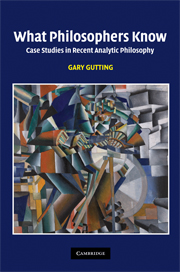Book contents
- Frontmatter
- Contents
- Acknowledgments
- Introduction
- PART I HOW DOES THAT GO? THE LIMITS OF PHILOSOPHICAL ARGUMENT
- PART II ARGUMENTS AND CONVICTIONS
- 5 Turning the tables: Plantinga and the rise of philosophy of religion
- 6 Materialism and compatibilism: two dogmas of analytic philosophy?
- 7 Was there a Kuhnian revolution? Convictions in the philosophy of science
- 8 Conviction and argument in Rawls' A Theory of Justice
- PART III PHILOSOPHICAL TRUTH AND KNOWLEDGE
- References
- Index
6 - Materialism and compatibilism: two dogmas of analytic philosophy?
Published online by Cambridge University Press: 05 June 2012
- Frontmatter
- Contents
- Acknowledgments
- Introduction
- PART I HOW DOES THAT GO? THE LIMITS OF PHILOSOPHICAL ARGUMENT
- PART II ARGUMENTS AND CONVICTIONS
- 5 Turning the tables: Plantinga and the rise of philosophy of religion
- 6 Materialism and compatibilism: two dogmas of analytic philosophy?
- 7 Was there a Kuhnian revolution? Convictions in the philosophy of science
- 8 Conviction and argument in Rawls' A Theory of Justice
- PART III PHILOSOPHICAL TRUTH AND KNOWLEDGE
- References
- Index
Summary
Some positions widely held by analytic philosophers seem obviously false. Materialism, for example, seems to deny our overwhelming sense that our conscious experiences have qualitative features (what they are like for us) that make them something beyond quantifiable states and events in our brains and nervous systems. Likewise, compatibilism seems to deny the obvious fact that we are free in the sense of not being determined by external causes to act as we do. The primary source of both puzzling doctrines is science. We incline towards materialism because scientific accounts seem to require that consciousness be nothing beyond matter. Given a complete set of the relevant scientific laws, it would seem that we could derive every truth about consciousness. We can maintain the obvious truth that we are conscious, but only by agreeing that, despite our distinctively qualitative experience of consciousness, it is in the end nothing beyond quantitative material processes.
Science is likewise the source of our backing away from our common-sense view of freedom. There seems to be good reason to think that scientific laws determine everything about us, including our free actions. Given a complete set of scientific laws, it would seem that we could derive every truth about our free actions. In order to save the apparently obvious truth that we are free, it seems we must accept the implausible idea that freedom can somehow be compatible with complete scientific determinism.
- Type
- Chapter
- Information
- What Philosophers KnowCase Studies in Recent Analytic Philosophy, pp. 122 - 150Publisher: Cambridge University PressPrint publication year: 2009



